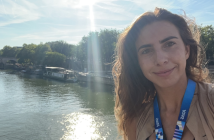Years before the coronavirus pandemic turned the world upside down, Mary Beth Quaranta Morrissey, Ph.D., MPH, JD, FCRH ’79, LAW ’82, GSS ’11, knew that expanding her knowledge of public health and research would be beneficial to her practice as a health care attorney. She earned her Master of Public Health degree in 2005 and, thereafter, received a Ph.D. in health and gerontological social work research at Fordham Graduate School of Social Service in 2011.
Leading the Pandemic Response
Morrissey has worked with many scientists and public health officials over her 25-plus-year long career, including while serving as president of the Public Health Association of New York City and the State Society on Aging of New York, and co-chair of New York State Bar Association’s (NYSBA) Health Law Section Public Health Law Committee. Appointed as chair of the NYSBA Health Law Section COVID-19 Task Force in early March of this year, Morrissey’s service as Task Force chair called for recognition and understanding of the critically important role of science in public health.
“We did a lot of work over the summer with members of other bar sections and communities outside the bar who were involved with the response to the pandemic and with healthcare, educating them about public health. Through that wonderful process of building relationships, I got to know many fine colleagues in the Bar Association whom I had not known previously,” Morrissey explains.
“Public health isn’t a well understood area of practice, not only in the law generally but in health law as well. And I was very pleased—as were all my colleagues in the Health Law Section—that we were able to reach a consensus in the Section, and thereafter, in NYSBA’s House of Delegates, which is not an easy thing to do given the range of issues here.”
Twelve individuals served on the task force, studying the legal issues related to COVID-19 and the pandemic, as well as representing different areas of concentration in health law such as public health, ethics, and providers. On Nov, 7, 2020, NYSBA adopted the Resolutions proposing both structural legal reforms in New York and a decisional framework to guide the public health response to the pandemic, including conditions for considering a COVID-19 vaccine mandate for certain affected communities as determined by public health authorities, except for those exempted by doctors. The task force’s report and nuanced recommendations address the needs of those disproportionately impacted by the pandemic—including immigrants, refugees, and persons who are incarcerated or transitioning to the community—and call for ensuring equitable access to virus testing, vaccines, and public health protections for all persons and communities.
“The recommendation we developed on vaccination was finely tuned, and made clear that a mandate should be considered only if certain things occurred first,” Morrissey says. “For example, a determination of safety and efficacy by appropriate public health authorities, an assessment by public health authorities of immunity in the community, and public education to build trust and encourage voluntary uptake of the vaccine.”
The resolution adopted by the association’s House of Delegates noted that it would be up to public health authorities to decide if a vaccine mandate is necessary, and whether it should apply to all state residents or to a smaller population like health care workers or students.
Deep Roots at Fordham
Not only does Morrissey credit her Fordham education for helping her be where she is today, but she still has strong ties to her alma mater. Serving as adjunct faculty in the Fordham Graduate School of Social Service and Gabelli School of Business, she taught a course on patient-centered care in Fordham’s master’s program in health administration during the spring of 2019, and is also a fellow at Fordham’s Global Health Care Innovation Management Center.
“It has been a pleasure working with Professor Falguni Sen who founded the Global HCIM Center—the first of its kind at Fordham. I first collaborated with Falguni in the development of a palliative care certificate program at a time when palliative care has been emerging as perhaps one of the biggest innovations in health care,” Morrissey says.
“At the Center, research science is also central to the goals of innovation. I’ve taught as adjunct faculty in the new Masters in Health Science Degree program Falguni developed and, from time to time, mentor students in the program who are interested in doing their capstone in palliative and end-of-life care.”
Morrissey reflects on her Fordham Law days with fondness and good memories. “I do a lot of writing, and I’m planning to do some writing about the family’s history,” she says. “While going through our family’s archives, my daughter recently stumbled upon a tape recording of one of my moot court presentations. I couldn’t believe it.”
She says she was thrilled at the discovery since moot court was one of Morrissey’s favorite experiences inside the old law school building, now home to the Gabelli School of Business.
Morrissey says the moot court experience has been foundational to her career. “I’m engaged in public speaking all the time, in terms of presenting my scholarship and, in this current role, presenting resolutions of the bar and responding to questions,” notes Morrissey.
“I think the moot court experience is so important early on in the law school education process, and I didn’t realize how much it would mean to me in my career. I’ve been able to hold my own in any circles, in any forums. I really credit the Fordham education with the wonderful and very exciting career I’ve had.”




